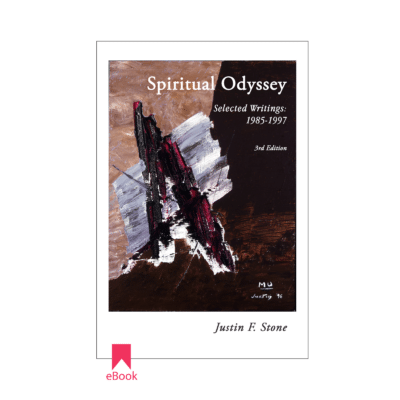
If you will go and live with a great Yogic teacher, you will find that that being is equivalent to consciousness. Since consciousness implies duality, this means there is something besides consciousness (awareness). Man is being (he thinks of himself as “a being”) and being is defined as Sat Chit Ananda (Being Consciousness Bliss). This implies that the very nature of being – and, therefore, of man – is bliss (Ananda in Sanskrit). Through “becoming” man attains to this bliss, which is his true nature. However, at a lower level, the Indian sages have said that man is predominantly one of three states (gunas): the pure sattvic state, the active rajasic state, or the clouded-over, dull tamasic state. If we are born with the third, the lethargic, fearful state of tamas, there is little we can do to attain bliss. We can work to better our makeup so we can attain bliss in another lifetime, but, the problem is, our lethargic, fearful nature will prevent us from doing so. To move up the ladder is rare. How many have the will to do so? How many will realize his or her own dullness?
An ancient saying is “As above so below.” All that exists in the macrocosm exists, potentially, within man, the microcosm. In truth, we are Divinity, but that blessed state is covered by clouds of ignorance. Avidya (ignorance – literally “not seeing”) is the cause of our troubles. Buddhism has said that there are over sixty states of mind, but we tend to stick to the three that bring us suffering: greed (the desire to possess, covetousness), anger (envy), and delusion (brought about by the tendencies that have developed by our habit energies, or vasanas). The conceit that sometimes comes from a little spiritual study makes any progress impossible.
When we live at a good ashram in India, faithful practice gives us an opportunity to first experience this bliss, which is not the satisfaction of desire. Then there is the danger that it makes everything else look insipid and we get stuck in the “Vertical,” the sense of oneness that keeps us from the world and from fulfilling our karma. This is why Zen speaks of “climbing a hundred-foot pole” and then going on from there, which, strangely enough, means descending from the exclusive state of oneness to live in the everyday world again (and to help others).
Teilhard de Chardin says that religion is the search for ultimates. This has nothing to do with dogma, doctrine, or institutional religion. How many people are interested in a search for ultimates, or even ask the question, “Why are we here?” Shallow character, complete concentration on daily problems of life, and desire for sense-gratification (including the need for entertainment and diversion) keep the average person from even coming to grips with the certainty that he or she will die – this being the one certainty. The search for security is hopeless: there is none. All philosophic search is meant just to bring us face to face with uncertainty and to accord with impermanence, which is not easy to do. To go deep within, far beyond thought, is the one way we have of getting answers or annulling questions. Usually, a true spiritual guide is necessary, but he or she cannot remake the gunas with which we are born or drastically change our karma (more accurately, the fruits of our karma). We will find our way, however, if we are sincere and really want to. It is helpful to remember that humanity’s real nature is bliss.

